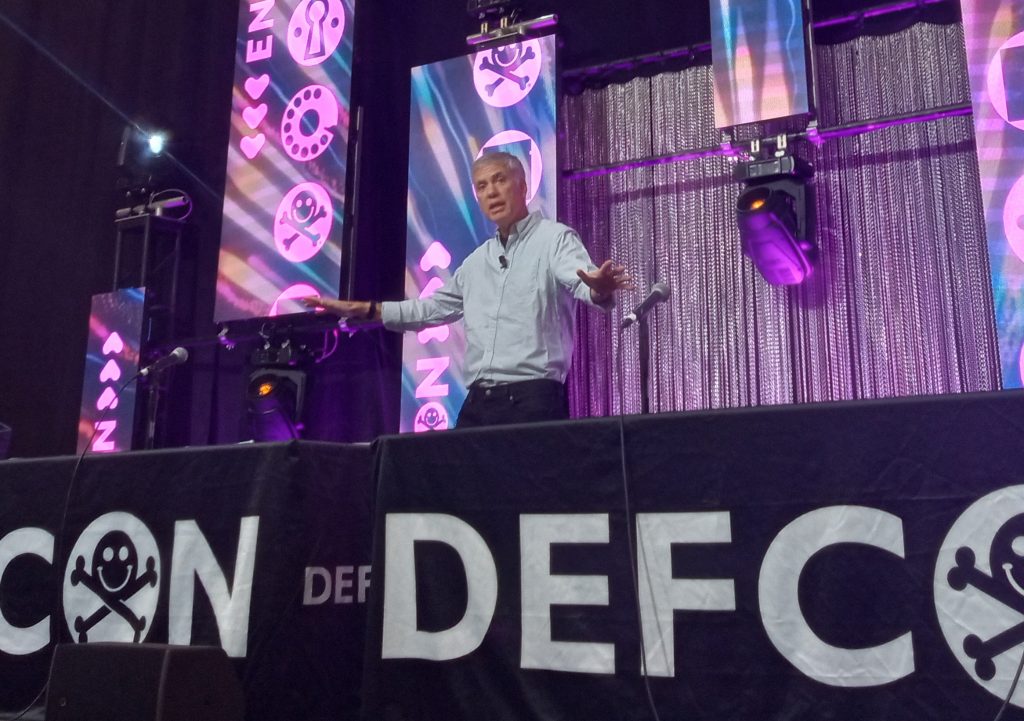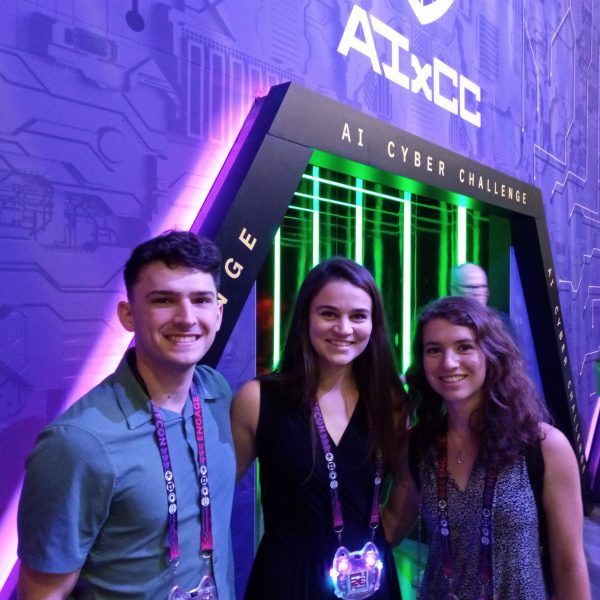
Vanderbilt computer science students got some real-world experience in cybersecurity when they joined Retired General Paul M. Nakasone at DEF CON 32, considered the world’s largest conference of hackers.
The conference, which took place Aug. 8-11 in Las Vegas, allows hackers to test the latest technology for flaws and give advice on how to avoid being hacked. It is largely attended by cybersecurity experts, government officials, academics and corporate leaders.
Nakasone, a former U.S. Cyber Command and National Security Agency chief who was recently named the founding director of the Vanderbilt Institute of National Security and a Distinguished Research Professor in the School of Engineering, was a keynote speaker on the main stage at DEF CON this year.
During his speech, Nakasone talked about escalating cyberattacks – like ransomware – that threaten national security and said, “new strategies and new ideas” and “unique partnerships” were keys to address the problem.
“Our intelligence is really good,” he said. “But I would tell you — the bottom line is we’re not keeping up. We need a new strategy. And whether that’s being able to bring a larger force with greater partners, a larger force of technology, or a larger force with a larger private sector, we need it.”
Nakasone told the assembled crowd that the new Institute is expected to launch next month and is well-equipped to address national security challenges, calling for engagement with DEF CON participants.
“It’s an institute that’s going to take artificial intelligence, cyber security, and intelligence for decision-making and apply it to the program that we’re developing,” he said. “So, I invite all of you, those that have done so much of the work that has been able to build our economy and understand what our nation does in cyberspace, to join us.”

Evan Hank was one of the three Vanderbilt students who attended the conference. He is considering a career in cyber defense in the U.S. Army Reserve and said he enjoyed spending time with Nakasone and other experts in fields like quantitative analysis, AI-prompt engineering, and cybersecurity.
“Talking to all of these people really broadened my scope of what the U.S is facing from foreign adversaries,” said Hank, a junior who is also majoring in human and organizational development. “It was awesome to watch a group of private hackers and government agents speak and work together to discuss the most prevalent threats in cyberspace.”
Douglas Adams, Daniel F. Flowers Professor and executive director of the Institute, said the students’ DEF CON experience falls in line with the Immersion Vanderbilt initiative.
“We give our students at Vanderbilt unique experiences to hone their critical thinking skills by immersing them in real-world settings that span different societal challenges,” said Adams. “It’s especially exciting that this year our students got to hear a center stage keynote talk from a Vanderbilt faculty member, Retired General and Professor Nakasone, who is a renowned expert on this topic.”
Workshop topics at this year’s conference ranged from protecting emails and medical devices to detection engineering and decision-making in healthcare cybersecurity.
There were also “villages” where different groups collaborated to address cybersecurity challenges in areas such as artificial intelligence and aerospace, as well as learn new skills. For instance, in the Aerospace Village, organizers said its mission includes creating, sustaining, and growing an inclusive community focused on aerospace cybersecurity, as well as inspiring the next generation of aerospace cybersecurity leaders.
In the AI Village, participants evaluated generative AI models’ vulnerabilities, similar to last year when technology companies gave hackers permission to test LLMs – like ChatGPT – for flaws and bugs that could be used to launch a real attack. The companies then took the data collected and retrained the models to be safer.
Vanderbilt senior Grace Suhocki and her sister, Ava, a junior, said they enjoyed visiting the villages.
“I was impressed by how welcoming and enthusiastic the different villages were,” said Grace Suhocki. “Learning about car hacking and its applications was particularly interesting.”
Ava said she appreciated the hands-on opportunities at the villages.
“I spent about an hour at a table picking locks with nine other people I’d never met before,” she said. “At the soldering village, I was taught one-on-one how to use a soldering iron and construct a small LED device, and then had the opportunity to try it myself.”
Makenna Messina, program manager for the Institute of National Security, said bringing students to a conference like DEF CON aids in their exposure of issues surrounding cybersecurity.
“Providing Vanderbilt students with an opportunity to build on their computer science knowledge through hands-on experience and direct interaction with experts in the field only advances their awareness and understanding of the intersectionality of the cybersecurity space,” Messina said.